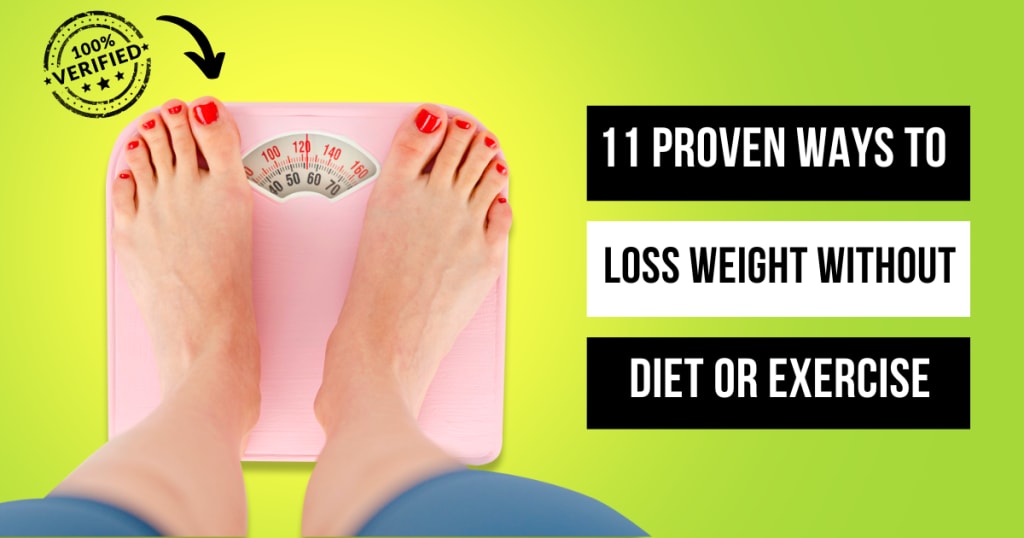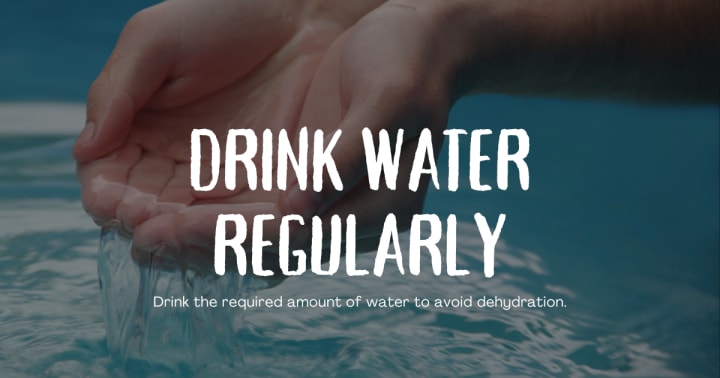11 Proven Ways to Loss Weight Without Diet or Exercise
Discover Science-Backed Techniques to Control Appetite, Reduce Calories, and Promote Long-Term Weight Loss

Introduction:
Losing weight is often associated with strict diets and rigorous exercise routines.
However, there are several other effective strategies you can incorporate into your daily routine to shed those extra pounds.
By making simple changes to your eating habits and lifestyle, you can achieve weight loss without the need for dieting or intense workouts.
Here are 11 proven ways to help you lose weight naturally and sustainably.
1. Take Your Time and Chew Thoroughly:
It is important to give your brain enough time to register that you have eaten enough.
By chewing your food thoroughly, you naturally slow down your eating pace. Interestingly, the speed at which you finish your meals can also impact your weight.
A review of observational studies found that faster eaters are more prone to weight gain compared to slower eaters.
Furthermore, fast eaters have a higher likelihood of being obese.
To help develop the habit of eating more slowly, you can try counting the number of times you chew each bite.
Eating slowly can aid in feeling more satisfied with fewer calories, making it an easy and effective strategy for weight loss and weight maintenance.
2. Opt for Smaller Plates for Unhealthy Foods:
Over the years, the size of the average food plate has increased.
This trend may contribute to weight gain since using a smaller plate can create an illusion of larger portion sizes, leading you to eat less.
On the contrary, larger plates can make a serving appear smaller, which may prompt you to add more food to your plate.
You can utilize this knowledge to your advantage by serving healthier foods on larger plates and reserving smaller plates for indulging in less healthy options. Consequently, using smaller plates for unhealthy foods can help you reduce your calorie intake.
3. Prioritize Protein in Your Diet:
Protein has a significant impact on appetite regulation. It promotes a greater sense of fullness, reduces hunger, and helps you consume fewer calories.
This effect is attributed to the influence of protein on various hormones involved in hunger and satiety, such as ghrelin and GLP-1.
One study discovered that increasing protein intake from 15% to 30% of daily calories resulted in participants consuming an average of 441 fewer calories per day.
Over a 12-week period, this change led to an average weight loss of 11 pounds, without any intentional restriction of other foods.
If you typically consume a grain-based breakfast, consider switching to a protein-rich meal like eggs.
In a study, overweight or obese women who ate eggs for breakfast consumed fewer calories during lunch compared to those who had a grain-based breakfast. They also ended up eating fewer calories for the rest of the day and the following 36 hours.
Some examples of protein-rich foods that can be incorporated into your diet include chicken breasts, fish, Greek yogurt, lentils, quinoa, and almonds.
These sources of protein provide essential amino acids and can support muscle growth, repair, and overall health.
Even without exercise or conscious calorie restriction, incorporating more protein into your diet has been associated with weight loss.
4. Keep Unhealthy Foods Hidden:
Having unhealthy foods in plain sight can increase feelings of hunger and cravings, leading to overeating.
A recent study revealed that individuals who kept high-calorie foods more visible in their homes tended to weigh more than those who only displayed a bowl of fruit.
To mitigate these temptations, store unhealthy foods out of sight, such as in cupboards or closets, to minimize their visual impact when hunger strikes.
Conversely, make healthy foods easily visible on your countertops and prioritize them at the forefront of your fridge.
5. Include Fiber-Rich Foods in Your Diet:
Consuming foods rich in fiber can enhance feelings of satiety, helping you feel fuller for longer periods.
Research suggests that viscous fiber, in particular, is beneficial for weight loss as it increases fullness and reduces overall food intake.
Viscous fiber forms a gel-like substance when it interacts with water, slowing down stomach emptying and prolonging nutrient absorption.
Plant-based foods are the primary sources of viscous fiber, such as beans, oat cereals, Brussels sprouts, asparagus, oranges, and flax seeds.
An alternative option is glucomannan, a weight loss supplement high in viscous fiber.
6. Stay Hydrated with Water:

Drinking water can be an effective strategy for reducing calorie intake and promoting weight loss, especially when consumed before a meal.
One study involving adults found that drinking half a liter (17 ounces) of water approximately 30 minutes before meals resulted in reduced hunger and decreased calorie consumption.
Participants who drank water before a meal lost 44% more weight over a 12-week period compared to those who did not.
If you replace calorie-laden beverages like soda or juice with water, the impact on weight loss can be even more significant.
7. Opt for Smaller Portions:
Portion sizes have steadily increased in recent decades, especially when dining out at restaurants.
Larger portions tend to encourage overeating and have been linked to weight gain and obesity. Serving yourself slightly smaller portions can significantly reduce your calorie consumption without you even noticing the difference.
8. Avoid Distractions While Eating:
Being mindful of your meals and paying attention to what you eat can help prevent overeating.
Engaging in activities like watching TV or playing computer games while eating can distract you from accurately assessing your food intake, potentially leading to overconsumption.
By eating without electronic distractions, you can enhance your awareness of food intake, eat less, and support your weight management goals.
9. Prioritize Sleep and Stress Management:
Sleep and stress are often overlooked factors in maintaining good health, but they can have a profound influence on your appetite and weight.
Inadequate sleep can disrupt the hormonal regulation of appetite, affecting hormones like leptin and ghrelin. Stress can also elevate cortisol levels.
Fluctuations in these hormones can increase hunger and cravings for unhealthy foods, leading to higher calorie intake.
It is important to prioritize sufficient sleep and adopt stress management techniques to maintain a healthy appetite and weight.
10. Reduce Consumption of Sugary Drinks:
Added sugar is considered one of the most detrimental ingredients in the modern diet.
Sugary beverages, such as soda, have been linked to an increased risk of various diseases.
Eliminating sugary drinks from your diet can have significant long-term health benefits.
However, it's important to note that replacing soda with fruit juice isn't a healthier choice, as fruit juice can also be high in sugar. Instead, opt for healthier beverage options like water, coffee, or green tea.
11. Use Red Plates for Unhealthy Foods:
Using red plates as a unique strategy may help you consume fewer unhealthy snack foods. Research suggests that this technique can be effective in curbing your intake.
The explanation behind this phenomenon may be that the color red is associated with stop signals and other warning signs, triggering a natural inclination to eat less.
By utilizing red plates, you can potentially reduce your consumption of unhealthy snacks and better manage your overall calorie intake.
Conclusion:
Losing weight doesn't always have to involve strict diets and exhausting workouts. By implementing these 11 proven strategies into your daily routine, you can achieve weight loss naturally and sustainably.
With these simple lifestyle changes, you'll be on your way to a healthier and slimmer you.
About the Creator
Evelyn Taylor
A front-end enthusiast and dedicated development engineer, eager to expand knowledge on development techniques and collaborate with others to build exceptional software solutions.






Comments
There are no comments for this story
Be the first to respond and start the conversation.